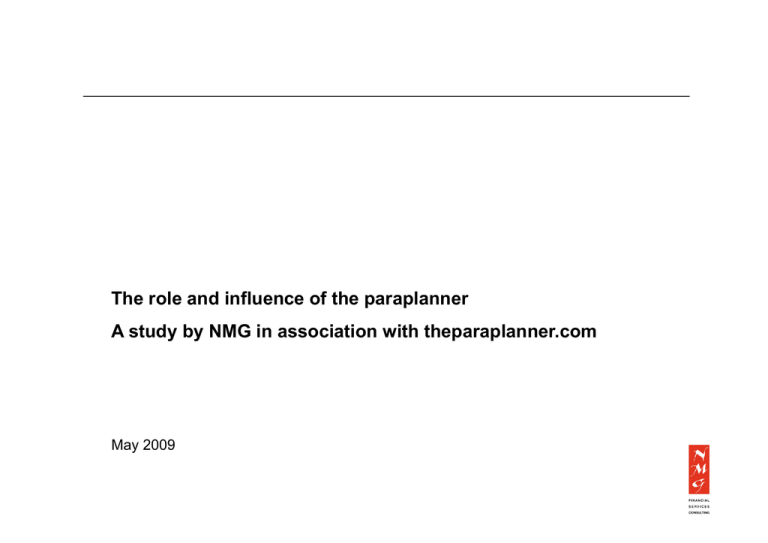NMG and The Paraplanner Paraplanner survey
advertisement

The role and influence of the paraplanner A study by NMG in association with theparaplanner.com May 2009 -1- The importance of paraplanners in 2009 The lack of a recognised definition for a paraplanner has led to much confusion and misunderstanding on the role they play within the advice process “A glorified typing service” A technical adviser” “Admin support” “Jack of all trades” “A technical geek” “A planner” “A trusted stead” • The industry struggles to define a role that is evolving, growing in numbers and becoming more influential • A number of market forces are combining which will result in the paraplanning role growing in importance over the next few years • This presentation seeks to understand the role and influence of the paraplanner both now and in the coming years -2- Research methodology NMG has conducted a comprehensive study amongst paraplanners to understand the key themes and trends emerging around this increasingly influential role • NMG conducted quantitative and qualitative research with paraplanners during April / May 2009 • An online survey was completed by 236 UK paraplanners, comprising over 30 questions (see Appendices) • This was supported by two central London focus groups and nine nationwide depth interviews to provide further substantiation and probing around key themes • Depth interviews were conducted across a number of paraplanning models, including self employed paraplanners, outsource paraplanning businesses and employed paraplanners, whilst the focus groups comprised mostly employed paraplanners from within wealth firms • The survey is the most comprehensive study into the role and influence of paraplanners to have been conducted in the UK • This presentation contains the major themes emerging from our analysis – there is a host of more detailed data behind the themes -3- Paraplanner role Paraplanners need to be recognised as a distinct resource within the IFA business model • Roles are clearly delineated between advisers and support staff: ADVISER Business development Client relationship management Advice PARAPLANNER Product & fund research Analysis Report writing SUPPORT New business processing General administration • Professional standards (NOS) will provide further clarity and definition and will help position paraplanning as a profession distinct from IFA support • This is important as paraplanners currently perceive there to be much confusion within the industry around their role and responsibilities “There is much confusion around what is a paraplanner” -4- Paraplanner profile Desire for qualifications and ambition to seek adviser status suggests many will fall into the “New Model” segment accelerating the pace of change underway • • Typically younger, highly qualified, frequently graduates: – 43% hold a university degree compared to 24% of IFAs – Average age 37 compared to 48 for IFAs No longer just ‘progressing’ from admin support: – • • • 21% from IFA/adviser roles Highly technical and clear hunger for advanced knowledge: – CFP 1–5 and Diploma commonplace – 26% with RDR level qualifications “Everyone is CertFP or FPC qualified to a minimum and then most are at various stages of the Diploma” Paraplanning is a career choice in its own right as well as being a route to adviser status: – 55% plan to stay in current role – 22% aim to become advisers “For me it is my career progression to be an adviser” Average income £27,000 -5- Career aspirations Paraplanning is becoming recognised as a professional career choice, although almost a quarter plan to progress to IFA status • Paraplanning is generally perceived in two ways: - Career paraplanning – those that wish to excel in paraplanning, who see it as a profession in its own right, who enjoy the technical aspects and have no desire to become regulated 9% 6% 8% 55% - A stepping stone to advisory status – those who wish to gain experience, obtain qualifications, learn from other advisors as part of a career plan to becoming an independent adviser “I am more of a technical geek…I am not sure that being an Advisor is something I am that interested in” 22% Remain in current role Become an IFA Start own paraplanning business Leave the industry Other (Please specify) Base: All respondents (236) Q10: Which of the following best reflects your current career aspirations? -6- Profile of career vs IFA paraplanners Career paraplanners tend to be slightly older and much greater numbers are female; those planning to be IFAs are more likely to be graduates Plan to become an IFA Career Paraplanners Base: 52 Base: 129 31 39 56% Male 34% Male 44% Female 66% Female University degree 67% 35% RDR level qualifications 27% 27% Average Age Gender Base: See Table -7- Activity splits Pure paraplanners spend majority of their time on technical tasks, whilst smaller firms will require paraplanners to undertake admin related tasks however business efficiencies are likely to change this • • • • Pure paraplanners focus on pre-sale work – research, report writing – accounts for 70%+ of their time Report writing 3% Smaller firm paraplanners likely to undertake more administrative activities given lack of additional support 6% 3% 9% Employed paraplanners unlikely to see a client on their own but frequently attend meetings with adviser 33% 21% 24% Conducting product, fund and provider research Administrative tasks (e.g. submitting new business, follow up etc) Meetings with advisers (e.g. to discuss a case) Own training, CPD and personal development Meeting with clients (either alone or with an adviser) Other (please specify) Outsourced paraplanners rarely see the end client to avoid any competition Base: All respondents (236) Q4: What percentage of your time is spent on each of the following activities? “No eye contact” “We don’t exist as far as the client is concerned” -8- Adviser vs paraplanner influence Paraplanners are often highly influential in both product and fund choice and are key individuals when it comes to fund platforms, often more likely to be regular users than advisers • Outsource paraplanners and paraplanner focused firms deliver reports based on adviser meeting notes and client objectives; these are typically accepted by adviser and presented to client without change “The IFA reads through the report before it goes out but rarely changes anything” • Smaller firm paraplanners may take more guidance from the adviser and operate on a team basis, sharing ideas and recommendations before the report is written • Although choice of platform is generally driven by the firm, paraplanners are using platforms regularly, often daily • However generally low contact is made by platform representatives direct to paraplanners despite their high usage -9- Provider services Paraplanners are asking not to be ignored; education of broker consultant sales forces on role and influence of the paraplanner will be important for success • Model appears to be changing as providers and their broker consultants begin to recognise the influence of the paraplanner – gradual change over past two years needs to continue • Greater tailoring of services and communications will help improve paraplanner satisfaction e.g.: – Tailored training e.g. on products, fund, wrappers (not a sales pitch!) – More proactive in contacting and keeping paraplanners updated – Resolving issues and taking ownership – Targeted communications – Build broker consultant relationships – Seminars tailored for paraplanners e.g. more emphasis on documentation, processes etc… as well as products “Everything they do with IFAs they should be doing with paraplanners” “Broker consultants still play golf with the IFAs because they believe that is the way to go. It may not be the way in three years’ time” - 10 - A national standard for paraplanners Support for a recognised standard is strong and its development will be a key factor in providing clarity and consistency for the paraplanner role • General support for a standard role description for paraplanner to help it be recognised as a profession in its own right “Can only be a good thing to define the role, will help in a number of ways” • NOS 26% Issue in how to accurately define the role as there are many variations currently in the market 0% • 36% Will help remove the support staff who currently call themselves paraplanners which adds to the confusion over the role 10% 20% 30% Very positive 40% 50% 60% 70% Quite positive “Such a grey area between administrators and paraplanners… fantastic idea!” Base: All respondents (236) Q11b: The Financial Services Skills Council have recently written the National Occupational Standards for the role of Paraplanner. This will provide an industry recognised framework for the role. Which of the following best describes your views towards these NOS for paraplanners? - 11 - 36% feel that they do not know enough about the NOS to comment NOS qualification General support for a paraplanner qualification is likely to also help the future professionalism of the role and will fit with RDR developments • Mostly supportive to idea of a standard qualification for paraplanners to demonstrate their professional standing • However, many believe it is sensible to base it Is there a need for an on existing exams such as CF1-5 rather than NOS related qualification create a new set “I don’t think creating a brand new set of exams would be recognised by advisors anyway” • Helps with career planning and fits with RDR developments • Those less supportive reject the idea that another qualification is necessary when so many are already highly qualified for role and feel that the exam process already established 21% 0% 10% 41% 20% 30% Strongly agree 40% 50% 60% 70% Slightly agree 18% feel that they do not know enough about the NOS to comment Base: All respondents (236) Q11c: The FSSC is also currently consulting on whether there is a need for a specific 'paraplanning' qualification based on the NOS. Please state to what extent you agree that there is a need for this. - 12 - The new model Under the new model, advisers focus on client relationship management and all non relationship management activities are allocated to the most appropriate resource Generalist adviser role; Admin focused support roles Advisers Advisers Support (roles not clearly defined) Client focused adviser role; technical and admin support Paraplanners Administrators • In the new model there are clear demarcations between advisers and support roles • Paraplanner and adviser skills differ – the paraplanner is likely to be a good researcher and report writer, whilst the adviser is the business driver and face-to-face communicator “You need both, paraplanners tend to be techies more; advisers are more about personalities and people relationships” - 13 - Contact NMG David Burns (M) 07771 893 939 (E) David.Burns@nmg-group.com theparaplanner.com Martin Vaughan & Richard Allum (E) martin@theparaplanner.com (E) richard@theparaplanner.com



